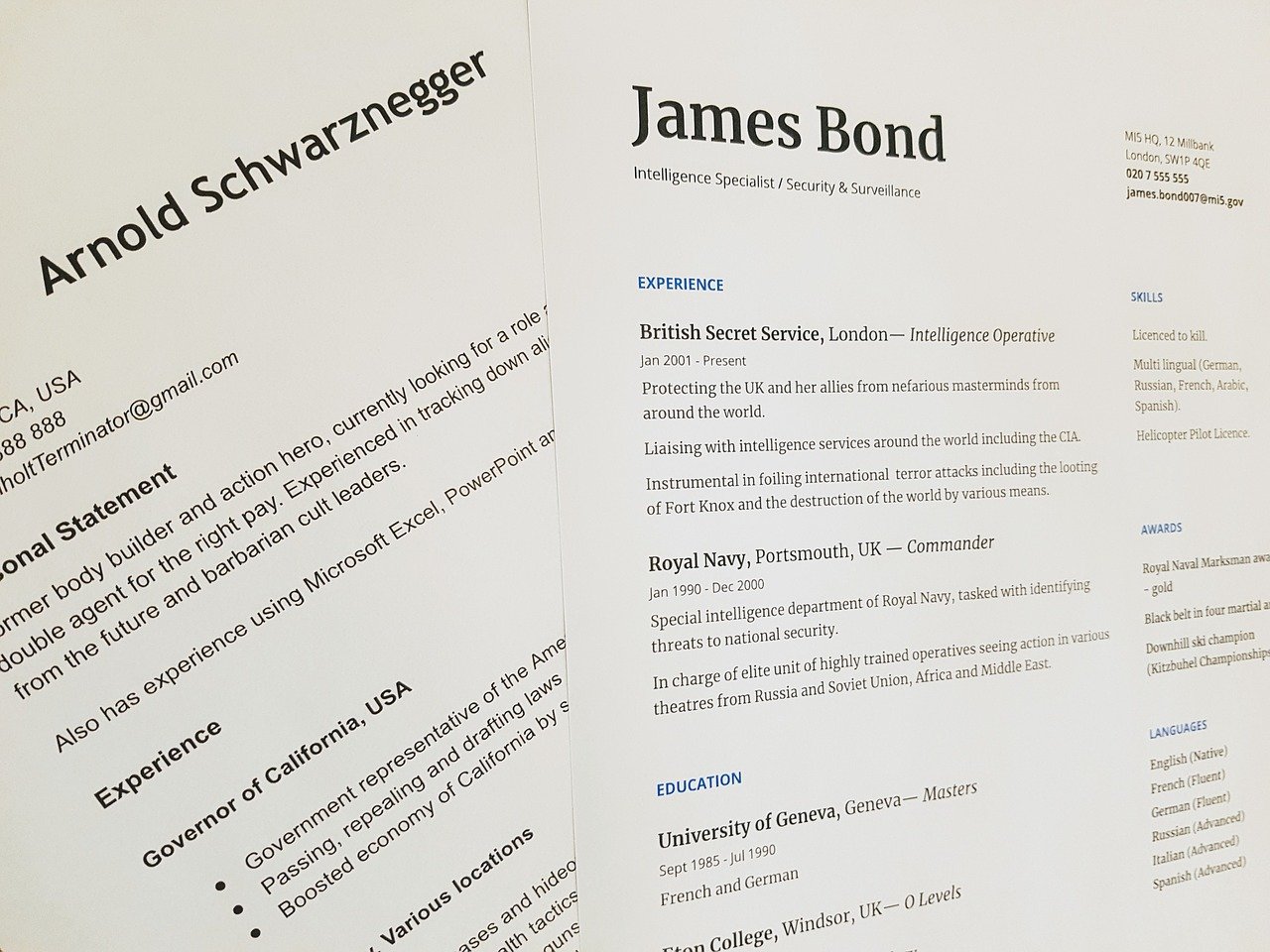
Dangerous little things that ruin your resume
It is not only the key content like information about work experience, achievements, and skills that are important on our resume. The format of this information is also important. And so that there’s no “unnecessary details”. These details may seem insignificant, but they can ruin the whole impression. You can say- “Recruiters are just too picky!”, Or you can read this article and improve your resume by removing these annoying common mistakes and start a new job search! Whatever you choose, we wish you good luck!
1. Too long(or too short)
Don’t! Write a 10-page long poem about your work experience, even if you are a qualified professional. And don’t! Write just two words describing your previous work experience like “Sales, Customers”. This happens very often, especially if the candidate is applying for a high position and salary.
“The most appropriate option is a clear, understandable and structured description of responsibilities, a maximum of 2–3 pages,” comments George Hudson, head of the HR department of Technoprogress Group. – It is surprising when an applicant repeats the same functionality in the description of different jobs. What for? Or when it is obvious that the job description is copied from open source. “
According to psychologist and HR expert Calyma Maximiliana, a resume on more than three pages is not only challenging to read, it can also be an indirect indicator for a recruiter that a candidate does not know how to highlight the main thing in information and briefly formulate the essence. And these are essential qualities for any area of work; for some, they are key. Usually, such judgment is confirmed during the interview.
“Sometimes candidates just copy the job description into the Responsibilities section of their resume”, says Teresa May, CEO of the recruiting agency. “It certainly puts off recruiters.”
2. Text without any structure
“Free-form resumes are often unreadable,” says Frederick Robertson, HR Director of Synergy Corporation. “For example, there are resumes in which job functions are written in solid text and general wording.”
Bella Samuel confirms that she comes across resumes written in an artistic style in the form of an autobiography. And sometimes, everything on it is chaotically mixed at once: work, home, family, children, hobbies, leisure.
Don’t confuse a resume with an autobiography. You have to give the document a structure. If there is a lot of information within the “Experience” section (you want to talk about both responsibilities and achievements), do not write it in continuous text, use subheadings, bulleted lists – just make it easy to understand!
3. Errors and misprints
Factual, grammatical, conspicuous syntactic and stylistic mistakes, and even common typos in the resume of specialists whose work requires literacy, attentiveness, will immediately put off the recruiter. However, such resumes are not uncommon. Let’s say a job seeker is applying for a job as an e-mail marketer with the function of writing newsletters, but his resume is replete with errors and typos. And he must be wondering – why there’s no answer to his applications?
If you wrote your resume in a hurry, do not be lazy to read it through carefully. You can use some free text literacy service(at least).
Even if we are talking about technical specialists and the vacancy does not require the perfect knowledge of the native language, some mistakes will be considered as very alarming: for example, in the name of the desired position, in contact information, and even in your own name. Such mistakes indicate negligence.
For example, Bryan Navas, senior HR manager at ICL Services, had a case when a candidate applied for a position of the economist, which requires working with numbers, meticulousness, and attention to detail. On that candidate’s resume, the simplest mistakes were encountered. For example, the length of service was incorrectly calculated, and the person could not calculate the percentage of personal income tax, confused the indicators – and as a result, got refused.
4. Sloppy design
A resume is a business document. It is wrong if it looks as if it was written in a hurry on the knee. The gross negligence in the text causes an adverse reaction from the reader and a desire to close the document immediately. For example, according to Brett Rogers, HR director of the World Gym fitness club chain, such reaction is caused by the use of a large number of abbreviations and abbreviations without decoding. Gemma Adams, HR-partner of the KB-12 group, says that typing in the CapsLock mode is not the best attempt to attract the attention of an HR specialist to your application.
5. An excessive number of diplomas and certificates
It would seem that lifelong education is a fashion trend and will be an advantage in front of other candidates. But everything is good in moderation.
“I am alarmed by resumes in which a person lists five higher educations and a lot of courses on various topics,” admits Marta Kozlova, General Director of Interpraktika e-com recruitment. – And the more heterogeneous the directions of education, the more alarming it is. One gets the feeling that a person cannot decide what is close to him(or her), what his strengths are. “
If a candidate cannot explain why he needed this or that training, and it does not look like a logical continuation of the development of career aspirations, then a versatile education does not work in his favor. Often recruiters, who question the candidate’s motivation for training at an interview, hear something like: “I went to study for the company” or “I went to study cause I was bored”, “I was looking for my vocation, but it wasn’t it. ” Such answers cause bewilderment and involuntary fear that a person also responded to a specific vacancy thoughtlessly, cause they were bored, perhaps mistakenly.
In fact, looking for your vocation is expected at any age. And there is nothing terrible in studying just for the sake of broadening your horizons – it is great that you prefer intellectual leisure. It’s just that the resume should be limited to mentioning only those diplomas that are of direct or at least indirect significance for the vacancy for which you are applying. The same principle applies here as for versatile work experience: you don’t need to list everything – indicate what is important for the desired position. A resume is not an autobiography. It is selective information about you that should convince the employer that you are suitable for a specific job.
6. Weird e-mail address
Yes, they also pay attention to this, and quite often. The point, of course, is not the address itself, but the fact that an inappropriate e-mail address for a resume may raise doubts that the candidate understands the boundaries between informal private and business communication, or that he is familiar with the basics of business etiquette. And this is important for a successful working relationship.
You started e-mail in your youth and came up with a login, which then seemed funny or spectacular, so have you been using it ever since? Try to look at your login with a third-party glance: how would it look on a business card – appropriate or ridiculous? If there is even the slightest doubt, then such an e-mail address does not belong in the resume.
For business contacts, including for job applications, it is worth setting up a separate mailbox with a neutral address.
“I would immediately put aside a resume that came from an address, for example, [email protected],” says Emily Watson. “The candidate’s e-mail address must be correct for business communication.”
Victor Morgan, CEO of the recruitment agency, recalled a whole collection of strange e-mail addresses that immediately formed a frivolous impression of candidates – blondie, coolgirl, devast8, thebeast.
If a similar e-mail address is combined with a photo that would only be suitable for a dating site, then it can ruin a resume even with the most brilliant professional experience.
7. Extra information
This includes not only details about hobbies, personal life (about everything that is not related to work) inappropriate in the resume, but also unnecessary information about the previous job.
For example, Katherine Lyma, HR Director, remembered a resume in which the applicant, for some reason, mentioned that he was suing his former employer because of delayed wages. It was not the fact of the court that surprised me (protection of your rights is normal), but the fact that the applicant thought that this information must be indicated in the resume. Perhaps he did it as a hint: “Look – you will offend me, I will sue you, I can!” You can hardly expect a positive reaction, starting a business relationship with such a note.
Give your resume the makeover it needs to generate interviews. Use our professional resume writing service today!
